Steve Vai: “One ear has been pulled towards rock my whole life, the other towards high-information music; my brain mixes it up and that’s when you get the weird Vai s**t”
Steve Vai drops in to talk Vai/Gash, Whitesnake, the unmatched integrity of Tom Waits, the appeal of ‘big, hairy guitars” and what guitarists can learn from the human voice

Want all the hottest music and gear news, reviews, deals, features and more, direct to your inbox? Sign up here.
You are now subscribed
Your newsletter sign-up was successful
Steve Vai has played with some of the greatest vocalists in rock music but the greatest of them all might have been the one we never got to hear until now.
David Lee Roth, David Coverdale, Ozzy, Lemmy, Vai has worked with them all in some capacity. As a young buck with an ear for transcribing and a prodigious talent for the electric guitar, he made his bones in Frank Zappa’s band. And yet his friend, the late Johnny ‘Gash’ Sombrotto, an untutored fellow biker born with a voice and all attitude is by Vai’s lights right up there.
Vai/Gash is our posthumous introduction to this voice, this force of nature, and it is an album that offers ample evidence to support Vai’s endorsement. Tracked at the dawn of the ‘90s, fast, unrehearsed, in the moment, it was intended to be the Vai and Gash’s soundtrack to weekends spent on the back of a Harley Davidson. It is straight-up hard rock, with a hydrocarbon rhythm guitar tone – all organic crunch – and solos that say their piece with a minimum of fuss.
The album never got finished. After Gash’s death in a biking accident in 1998, Vai put the material on cold storage. He “blacked out” and tried to move on. But now the time was right to go back to it, to apply the spit and polish and put it out.
It finds Vai in an alternate mode to that of Inviolate. Inviolate was the sound of Vai as frontiersman, staking out new territory for the instrument, inventing new techniques as he did with joint-shifting on Candle Power, inventing a new instrument with Ibanez in the form of the triple-necked Hydra. Vai/Gash is a throwback to the late ‘70s, early ‘80s, the generation of Linklater’s Dazed & Confused.
“I wanted to rip something out that was really straight ahead, no frills, no extended guitar solos or widdly-widdly in between,” says Vai, joining us live from the Harmony Hut, his home studio and base camp for guitar adventure. “I just wanted prrrrrr! Uplifting! I wanted it to make us feel the way we did when we were riding.”
Vai/Gash serves another purpose for the wider audience. For those who’d sooner take the train than to two wheels, it reveals a side to Vai that we see rarely, yet that’s always there.
Want all the hottest music and gear news, reviews, deals, features and more, direct to your inbox? Sign up here.
The rocker who could park himself in the Whitesnake groove and drop science on six-strings and elevate the material. The shred foil for David Lee Roth when he went solo and needed the best player on the planet. That Vai has never gone away he explains but he is pulled between two extremes, the fundamental principals of rock, and what is possible on guitar.
This record is our introduction to Gash but even just by the time it is finished we get a real feeling for who he was by the time it is finished. Did releasing this give you a sense of closure?
“It’s an odd feeling, because you really had to know Johnny Gash. I mean, he was such an extraordinary character. And by that time when I made that record, I had worked with a lot of lead singers in rock ’n’ roll, from Zappa to Roth, Graham Bonnet, David Coverdale, Lemmy, Ozzy, tons of people, and y’know there is a difference between being a great singer and a rock star, a person who has that DNA, who can stand on a stage and just be engaging, charismatic, commanding, empowered, confident.
There is a difference between being a great singer and a rock star, a person who has that DNA, who can stand on a stage and just be engaging, charismatic, commanding, empowered, confident
“I’ve seen it. I’ve been involved with every type. And there is a difference between that [and being a good singer], and nary to they meet where you have a great singer who has got the real charisma like a David Coverdale. But Gash had both to me. Whenever I would listen to the record, because I knew Johnny, I loved it. I loved it. Because he was such an interesting character.
“He was crazy, and did insane things, but he was so charming and charismatic, and loveable. He was endearing, and funny, and a pain in the ass sometimes! All these things! Totally unpredictable, man. Totally unpredictable. I could tell you stories, you just wouldn’t believe.”
You say crazy and unpredictable, and then we read he is from Queens, NY, and it kind of all makes sense.
“Yeah, and you can hear New York in his accent, in his singing voice. People will hear this and say, ‘Oh, it sounds like when he was with Roth, or Whitesnake, or Alcatrazz.’ But there are big differences in it for me.
“Obviously, I am the same guy who was playing on all those other records, and I have certain stylistic nuances and idiosyncrasies – and I love rock ’n’ roll. One of my ears has been pulled towards rock ’n’ roll my whole life and the other is high-information music; my brain mixes it up and that’s when you get the weird Vai shit.
With the Gash record, I didn’t want to be the Steve Vai that got in the way of the vocal. It needed to be really powerful
“But the rock ’n’ roll is in there, and I loved that. The Roth stuff is more West Coast sounding, it’s kinda like California, it’s got that vibe. Gash is as hardcore East Coast, New York, Italian biker as you can get. The worlds don’t meet. Not the energy; just listen to that voice, the accent, and the… cheekiness. [Laughs]”
Gash's voice gets stronger as the album goes on. Did you sequence it in the order that you recorded it, and this was him really hitting his straps the more takes he did?
“You may be correct in that. I don’t recall the order. I think I did In The Wind first, but the thing about Johnny was, he had never sang. He had never sang rock ’n’ roll! He sang crooner. He could croon so beautifully. He did Frank Sinatra. There is a video of him online – he made a video for his dad – singing Frank Sinatra. Beautiful.
“But I could hear his voice, just his speaking voice, and his yelling voice, my instincts said there’s something in there. Affter I tried to sing the record, which was an abysmal disaster – I don’t have that rock ’n’ roll voice – I got him in the studio and was stunned, like, ‘Are you kidding me!?’
We were great best friends and Gash trusted me musically, completely. Yeah, sometimes I think what we could have done in the future, and it is tough
“I produced every record I ever recorded of mine, and I have recorded great singers, and I could tell that he was just starting. I could hear things that were raw, unfiltered and energetic, like a teenager, but I also knew there was going to be a development. There were certain ways that he was singing that I thought, ‘I wish I had time to work with him.’
“I was planning on going back and tweaking some things, explaining, ‘Try this. Watch what happens if you do this.’ Because he loved me. We were great best friends and he trusted me musically, completely. Yeah, sometimes I think what we could have done in the future, and it is tough.
“Like, he never did a concert. He never did anything. He just blasted that shit out and I knew that, given time, it would develop into stuff that – well, we don’t know. I guess the universe had other plans.”
As a guitar player, when you are working with a vocal like that, are you conscious of pulling back a little and making space, and giving it more room?
“Yeah, you have to keep all these things into account, and my focus on a project like this has parameters. Just like my focus on Flex-Able had parameters, and Passion And Warfare, Sex And Religion, and the orchestra music that I do, you apply parameters to create flavour, and with the Gash record, I didn’t want to be the Steve Vai that got in the way of the vocal. It needed to be really powerful.”
You then know exactly what it needs.
“Now, I love playing rock rhythm guitar like that. It is freedom. It feels so good, and I nail that shit back then. I could eat that shit for breakfast. You just gimme it and I’m gonna have so much fun with it. That was something that I wanted to do on this record. The concept was every song, straight ahead, big guitars, no excuses, no frills.”
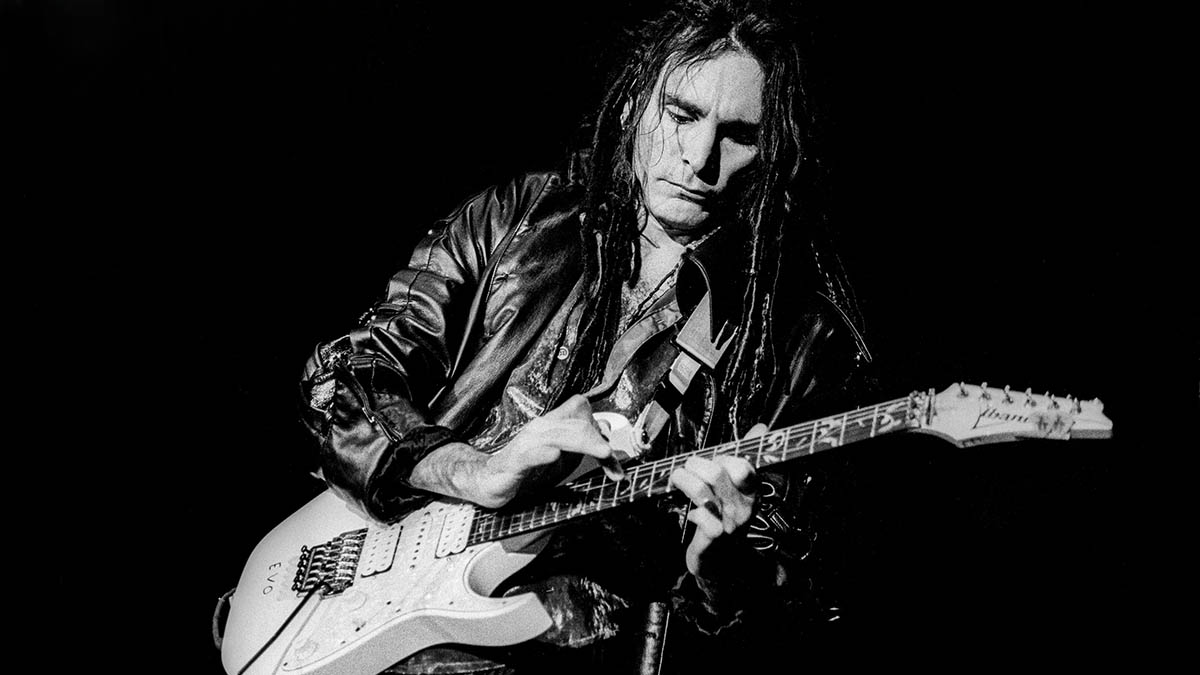
And that is a change of pace for you.
“The difference between this record and all of the other records I made outside of my solo work is every decision had a committee involved in it. ‘What song? Okay, you’re the guitarist, Steve. How does the rest of the band feel about what you are doing? How does the leader of the band feel?' The producer has a lot of say, the engineer, and then the label. ‘Oh, we don’t like that one. Do another one. Do this song.’
When I made the Gash record, it was a committee of one. Me. I go into the studio, lock the door, and create this beautiful wall of elegantly loose-but-tight rhythm guitar... Big, hairy guitars, everybody loves it
“I had an A&R guy come into the studio of a big band I was recording with, and I was playing harmonics. Now, you know what a harmonic is; it’s a squeal. It’s part of my style. It’s part of most guitar players’ styles. And he goes, ‘What’s that?’ And I go, ‘Oh, it’s a harmonic. You pinch it with your finger and…’ And he goes, ‘No, don’t do that. It sounds like a dying whale.’ And I said, ‘It’s a pinch harmonic!’ And goes, ‘Well take it out. Take it out.’ It is all over the whole record and he says, ‘Take them out. Take them all out.’ [Laughs] And I said, ‘Fuck you!’ [Laughs] Well, in so many words.
“When I made the Gash record, it was a committee of one. Me. I go into the studio, lock the door, and create this beautiful wall of elegantly loose-but-tight rhythm guitar. It feels good. Big, hairy guitars, everybody loves it.”
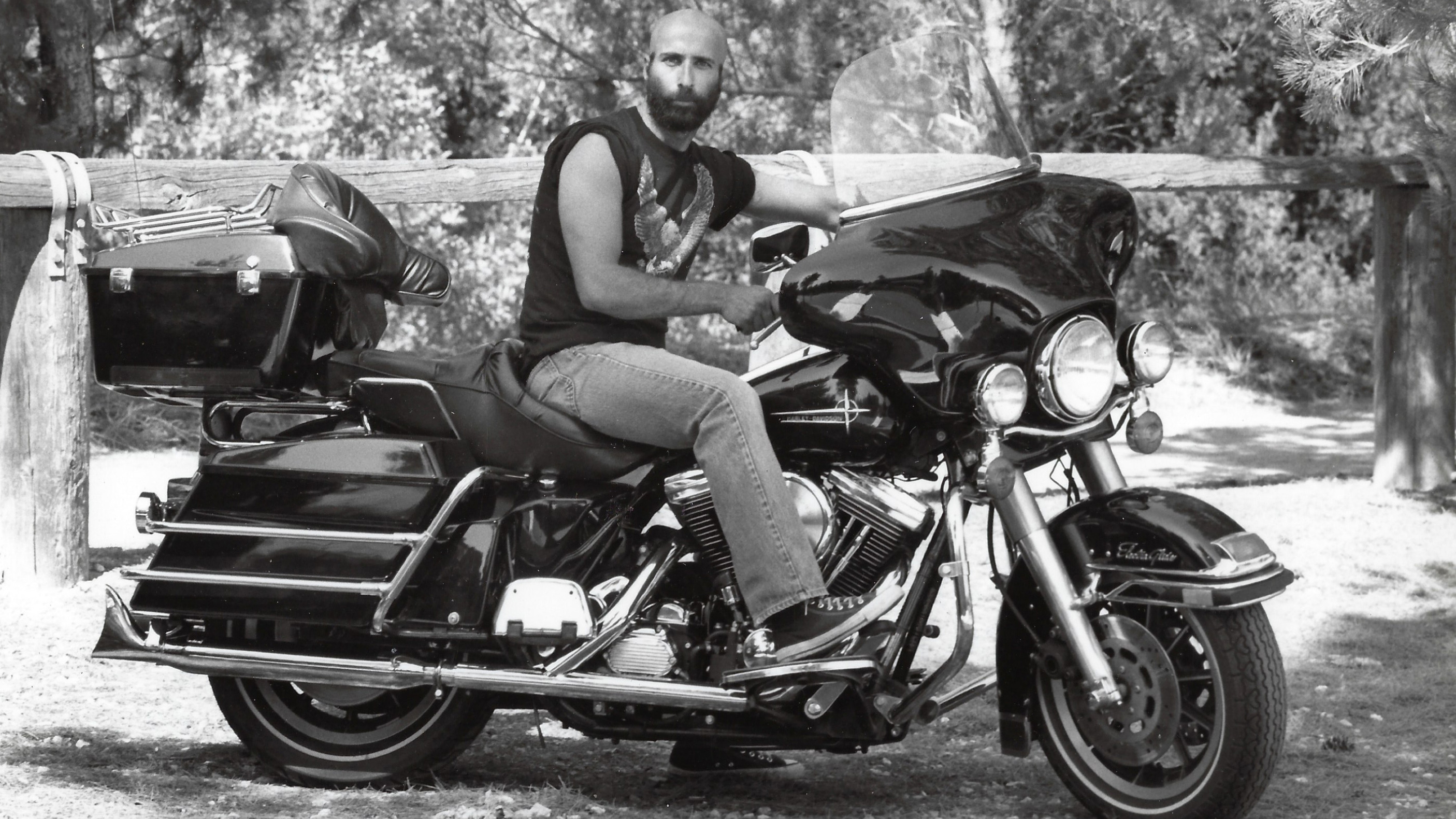
You need pinch harmonics! What rock band can afford a horn section? You need them in there. But what you say is what you get. Tracks like Busted have got that swing-time rock feel.
“You gotta remember, I was making this record for us to listen to while we were riding, and it was, ‘What an I gonna love?’ And I think I was listening to Radar Love, and I love the energy of that track, but there were a lot of in between bits that dragged it out. And this is how a lot of people write songs. You get inspired by something you hear and then you craft around it, but I liked the way Busted slams.”
It is a time-capsule record. You could not make this record now. Hard rock had its time of innocence in the ‘70s and ‘80s, and you can’t go back. It would be like trying to reengineer your childhood, your adolescence. That gives it a poignancy.
“Yeah, ‘cos my psychological makeup has evolved over the last 30 years, and I think it is a good point that you made because I don’t think I could go back there just like that, psychologically. I could, but something else would come out.”
We all go back for that feeling, that sense of when you are 14 and it’s the last day of school before summer, it’s sunny, Van Halen is on, no homework. We might get that feeling but its fleeting, and that makes it precious.
“Yeah, right!? Isn’t it nice to be able to look back and have that experience, of the last day of school, and the new Van Halen or whatever. For me it was Led Zeppelin. Yeah, that’s nice, and when I listen to this record, I’m there. It kinda gives you an opportunity to give yourself a little nostalgic hernia.”
And there is nothing wrong with that. Culture can be too enamoured with nostalgia. A little goes a long way but it reminds us of our essence.
“Contemporarily, if you try to recapture the glory days of yore, you don’t have that innocence, which is what you said. When I recorded this record, when Led Zeppelin recorded, there is a creative innocence, and an almost bombastic call to freedom that you feel internally at that age in your 20s, your early 30s.
“You are damn well going to make it real and nobody is gonna stop you, and it is going to be what you want. You just do it and you don’t care. At 62, I do that, but not like that. I do it with things like the Hydra! That’s my idea of a 62-year-old freedom-loving Steve Vai! [Laughs]”
Who else are we hearing on this record? Did Nikki Sixx write a song with you on this?
“Well, the song I wrote with Nikki [New Generation], I had written that way before I did the Gash stuff. We just got together one day and started writing, and this song came out and I demoed it. He is not on it but I demoed it and I put Gash on it and Nikki liked it. I sent it to him right before we released the record. And he sent me his new book. He said he liked it, so that’s good.
“But back them, I was very independent. If I wanted to record something I just did it. I would just find people. And there is an interesting story, though, because I couldn’t remember who the drummer was on this record.”
Really!?
“It was the weirdest thing! Because it was such a period of time, that happened so fast – like a week or something – and I was working with Brooks Wackerman at the time, and I totally forgot. When Gash died, I just blacked out. I put the record on the shelf. My mind must have forgotten because when I started to think who I had recorded the drums with, in my mind it was Brooks.
When Gash died, I just blacked out. I put the record on the shelf. My mind must have forgotten because when I started to think who I had recorded the drums with, in my mind it was Brooks
“For years, I’m thinking, ‘This is Brooks.’ And then when I am putting the credits together I wanted to make sure, and I sent it to him and he said, ‘No, that’s not me.’ I’m like, ‘Yes it is! That’s you! You were the only one who could sound like that who I was working with at the time.’ He said, ‘It’s not me.’ So I went on a quest to find out who it was, and trust me, I asked everybody I worked with in a 20-year period. I asked people who were around at the time!
“I don’t even know who the engineer was. I didn’t even have an engineer. I just went into the studio and did it, and so I didn’t know who the drummer was. And the record company’s like, ‘Steve, we need to find out who the drummer is here.’ ‘I… I… Just can’t!’ I missed the deadline for the credits and then I am laying in bed, three weeks after, and it is bugging me that I couldn’t remember who the drummer is.”
It’s kind of serious. You need to know who did what.
“Yeah! I’m lying there going, ‘Come on, Vai, get your shit together! You’re not that old! You’re not there yet!’ [Laughs] And then I said to myself, ‘You know how it was. You’re just not allowing yourself to know.’ Back, at that time when I made the Gash record, I was starting to contemplate what Sex And Religion was going to be and I started to audition drummers. And Gregg Bissonette had recommended one of his students, this girl out of Texas.
“Her name was Tiffany Smith, and as soon as I remembered... ‘Of course it was Tiffany!’ I flew her up from Texas. She came to my house for three days. And we recorded 16 hours a day, for three days. That’s what she said, because I called her. ‘Tiffany, did you play on this stuff?’ She said, ‘Yup, that’s me!’ And I said, ‘Of course it’s you!’ Because she sounded so good. We recorded 16 hours a day and the Gash stuff made up 60 per cent of what we recorded. I have got so much stuff in the vault.
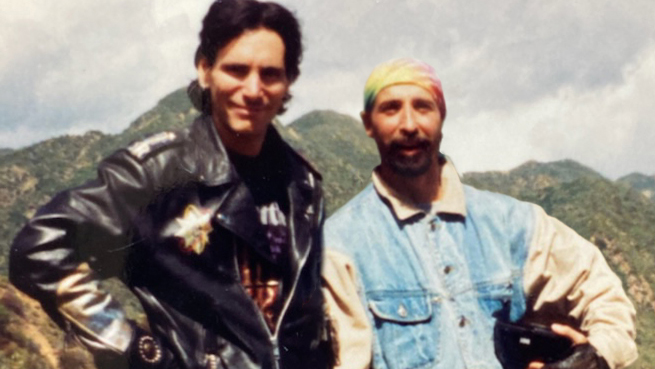
It is a great performance.
“I loved her. She had such great rock ’n’ roll instincts. She had a whole sound, and she would instinctually listen to the track that I had built with a click and an improvised bass part, guitars. I would just play it to her and she would go, ‘BAMM!’ Then Gash, he’d listen. I’d show him the words and he just nailed it. It went so fast.
“The only documentation of the whole project was the handwritten lyrics, and track sheets that gave no information of the date, anything. I had to ask a friend of mine who introduced me to Gash, way back in the day, when I recorded it, and he said, ‘You recorded this in 1991.’”
You had a lot of left brain, right brain stuff going on at the time. But here’s a question: do you remember what you played through?
“Now, this is just my recollection but I believe the guitar at the time was EVO [Vai's white Ibanez JEM signature guitar], because I am pretty sure I had it because it was my motorcycle days and that is how I named EVO, after the Evolution [engine] of a Harley.
“The amp sounds to me like my Bogner. And I think it was that period. But Jonathan, there was no thinking involved in making this record. I just went, grabbed the guitar, ‘Roll the tape! Let’s get this done! I wanna get on the road and listen to it.’ Solos? One take. No fucking around. All right, let’s go.”
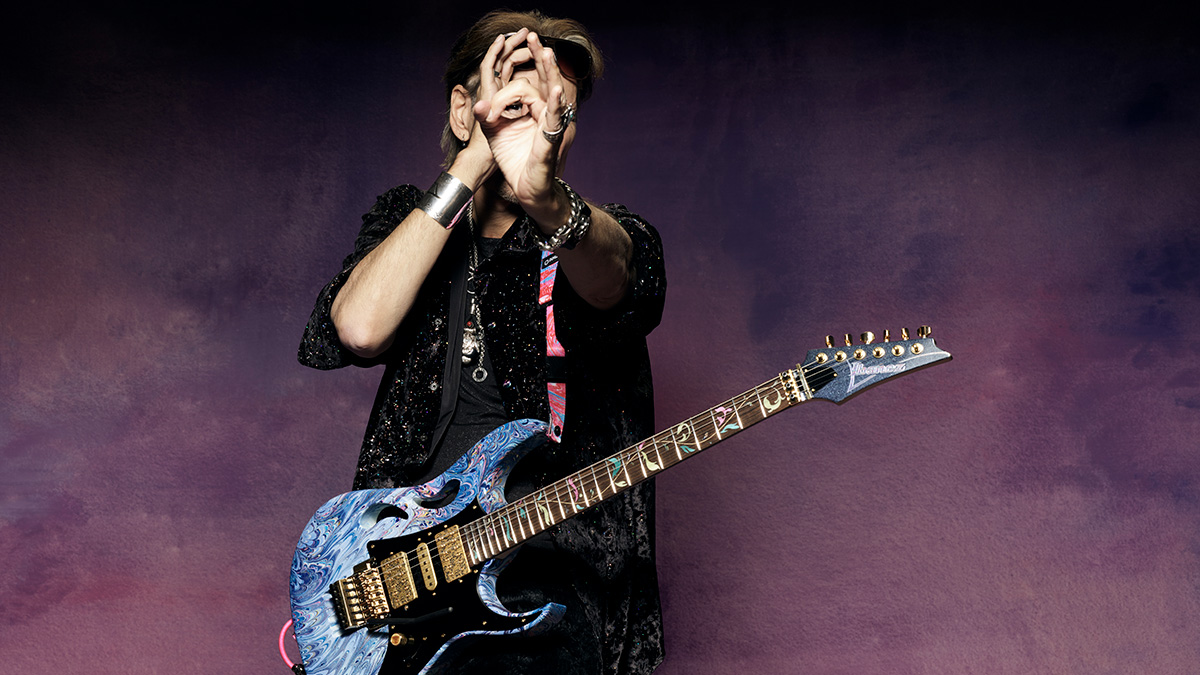
You make a lot of music than needs a lot of thought behind it. Sometimes you need to do something that doesn’t for balance. Sometimes I have you down as Steve Vai, green tea drinker, beekeeper, meditation. But you’re also Steve Vai, the biker, the rock ’n’ roll guy. You’ve got to feed both sides of the personality.
“Yeah, a person feels fulfilled when they are expressing all the various aspects of their creative intentions. I have kind of navigated it that way, and it’s funny because people say, ‘Oh, you’ve done so many different kinds of things.’ Yeah, why not? If something resonates with you, do it. The alternative is that you compromise your freedom.”
Freedom is great. You’ve got that. You can take your time, develop a new technique, invent a new instrument, but then you’ve got opportunities to jam with Whitesnake at Hellfest. That looked like a lot of fun, by the way, and something that maybe you needed to do to realign your chakras.
“You know how you were talking about how you can project into the past and find those nostalgic moments that give you a little lift, well, when I look into my past, the only thing I choose to remember are the things I enjoyed. What’s the alternative? So when I think about Whitesnake, there was so much that I enjoyed about that.
“I was so lucky. I felt very privileged just to be put in that situation for however long we did it, and to make such a cool record, and to tour like that. And David Coverdale, man, the guy was phenomenal, even if you are on the stage watching him. He never missed. He was always confident and he always sang great.
David Coverdale, man, the guy was phenomenal, even if you are on the stage watching him. He never missed. He was always confident and he always sang great
“The guys in the band were great fun. Adrian [Vandenberg] and I are dear friends, and I saw Rudy [Sarzo] the other night, and I saw Tommy [Aldridge] at Hellfest. Bands come and go, and come and go, and come and go, and I knew through all of it that eventually I had to be independent because I had too many ideas of what I wanted to do.
“When I did Passion And Warfare, I just thought that was the end of my career as a rock guy. ‘No one is going to get this record and that is fine! I still have to do it.’ It was like the Gash record. After I recorded it, do I wanna release this? And the answer was no because it was not quite done, but also because it wasn’t quite the right time because we were in grunge world by then.
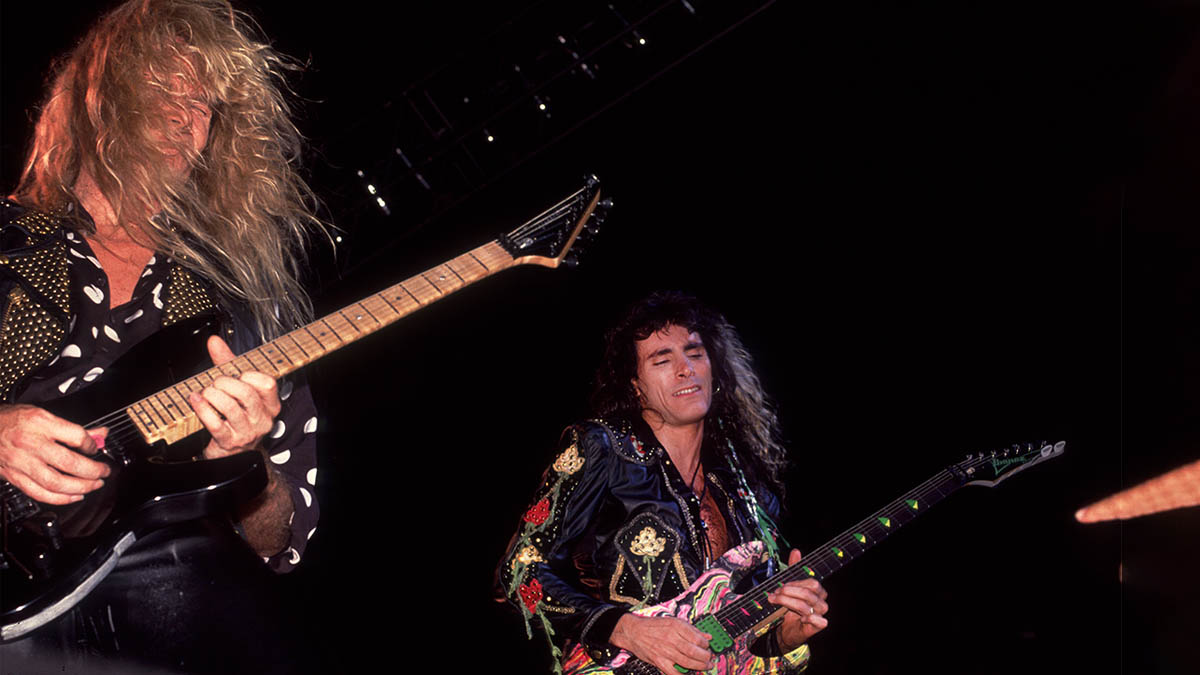
“I did enjoy the snapshot of the Whitesnake thing when Hellfest came along. I do feel incredibly lucky to be the sort of artist who can play on Hellfest and then on the same tour play Bospop, and I can do these different kind of stages. But Hellfest was just… Walking towards the stage for Hellfest, becoming that guy, y’know! And the fact that Whitesnake was going on after me was the bonus.
Being on that stage with David Coverdale again was just really a nice little reminder of how cool it was to be a rock star in the ‘90s
“I thought that David might reach out and offer me the chance to come and play, and I was very happy when he did. Being on that stage with him again was just really a nice little reminder of how cool it was to be a rock star in the ‘90s.”
Did you have to work at it to remember the parts?
“Well, I played Still Of The Night, last song.”
You would still remember that.
“That’s an easy song. It’s a nice song.”
There is a lot guitar player can learn from singers. Phrasing, all that stuff, what you can do with the instrument, what not to do. When not to play.
“Absolutely, good melodies are phrased like the way we communicate. Good melodies sound like the human voice in their phrasing. We use commas. We use periods. We use inflections, dynamics, all these things, and you can incorporate that into a melody and you are gonna play differently.
“One of the exercises I suggest to guitar players to extract that is to create a sentence in your head, about anything, it could be anything, and then play the sentence and keep playing it over and over. You are going to be doing those kinds of things we are talking about, mimicking a human voice.
“Otherwise, I could just sit here and talk to you like this all day in a monotone voice and just keep going on and on and… I could give you the secrets to the universe but it would be meaningless because you would get bored pretty quick and I’d sound like a shithead.”
A person feels fulfilled when they are expressing all the various aspects of their creative intentions.The alternative is that you compromise your freedom
Or a cattle auctioneer.
“A lot of people play guitar like that!”
Well that’s true, the verbal diarrhoea. Now, you’ve also just released a new torture manual, the Inviolate tablature book. How were the Hydra parts handled on tab?
“We had to have them written out so that each neck in on a different staff. If you are interested in that kind of thing, manuscript, and if you are fascinated with that guitar, and the song that I perform, Teeth Of The Hydra, if you have the manuscript you can actually see how it is all laid out.”
And people can build that together. Players are getting more and more clever with the looper pedals by the day.
“Oh yeah, sure! Because I am a guitar player, and there are so many guitar lovers in the world that are going through the academic stage, and are hungry for other guitar players’ stuff. Inviolate, if you are into that kind of thing, it’s nice guitar music to play, like Candle Power and Zeus In Chains – that’s so much fun. Little Pretty… I mean, they’re a little advanced, but they are fulfilling and you can see them now, and you can get the write notes.”
They’re advanced but when you finally get a breakthrough it’s like you’re flying.
“Yeah!”
Let’s wrap this up. Back to the road. What is the ultimate biker song?
“Born To Be Wild. Yeah, I think that many bikers would concur. And who knows? Maybe it’ll be In The Wind?”
And if there was one vocalist you could collaborate with, that you haven’t already, who would that be?
“Tom Waits. Tom Waits but he doesn’t collaborate that way, and I have tried many times. Are you familiar with my record Story Of Light? Well, there is a song on there called John The Revelator, and that was one I sent to Tom to see if he would be interested. And he basically said [no].
“I know him. I’ve had the privilege of meeting him a bunch of times, and it was very interesting because John The Revelator is an old classic. And he said, ‘A lot of people have done this song and they really do it in their own way.’ Tom’s integrity is bulletproof. He only does what his mind feels like he can resonate with authentically.
“Even saying Steve Vai and Tom Waits in the same sentence it’s like totally bizarre, but he is my favourite living artist. Interestingly enough, a couple of years after that, he came out with his own version of John The Revelator, so other than that, I’ve had the great privilege of collaborating with his favourites
“...Y'know, I’ve always loved Robert Plant. I always loved the idea of working on a couple of songs or something with him, but I am probably totally off his radar.”
Vai/Gash is out now on all formats via Favored Nations / Mascot Label Group. Steve Vai is touring the world in 2023. Visit Vai.com for full dates.
Jonathan Horsley has been writing about guitars and guitar culture since 2005, playing them since 1990, and regularly contributes to MusicRadar, Total Guitar and Guitar World. He uses Jazz III nylon picks, 10s during the week, 9s at the weekend, and shamefully still struggles with rhythm figure one of Van Halen’s Panama.
